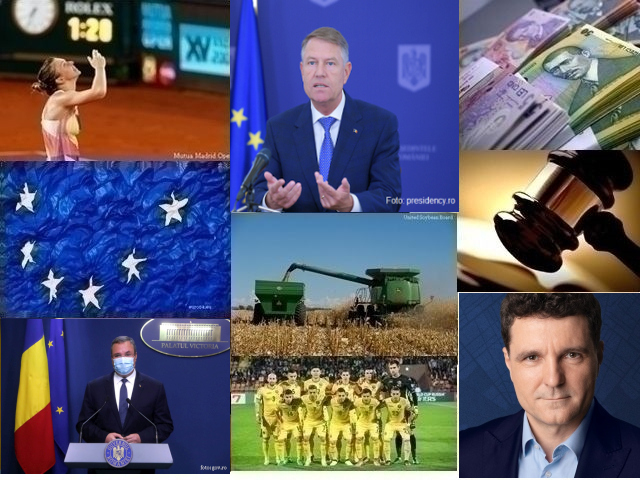October 8 – 14, 2022
The headline-making stories this past week

Roxana Vasile, 15.10.2022, 14:00
Romania and Schengen
Romania’s joining the Schengen agreement was intensively analyzed in the context of the visit of the Dutch Prime Minister Mark Rutte to Romania on Wednesday. Getting the Netherland’s support for accession has in fact been a major topic of high-level discussion. This is because, as of 2011, since Romanians have met all the technical conditions to be part of the free movement area, their accession has been opposed by several states in the European Union.
The Netherlands has consistently been one of them and still is the only reluctant member state. During Wednesday’s visit, Prime Minister Mark Rutte stated that his country was not against Romania’s accession to Schengen, but said that the process must be closely related to the reform of the judiciary and respect for the rule of law. President Klaus Iohannis pointed out, however, that failure of accession was not an option for Romania.
Meanwhile, experts from the European Commission have been to Romania this week, to check how the country is prepared to join Schengen. The European inspectors monitored how border controls are carried out, the asylum policy and the return of migrants, as well as the extent to which the staff is trained according to the rules of the European free movement area. Accession to the Schengen area of free movement of people and goods will allow citizens to cross the internal borders of the European Union without being controlled, will facilitate trade or tourism and will be able to open even more business opportunities.
Bucharest condemns the escalation of violence in Ukraine
Russia has this week escalated the war in Ukraine to a new level, targeting buildings and public spaces with missiles and wreaking terror and destruction in cities in almost every province, in response to an earlier attack on the Kerch Strait bridge that connects Russia directly with the Crimean peninsula, annexed by the Russians in 2014. President Klaus Iohannis has strongly condemned, on Twitter, the Russian attacks. The crimes committed against innocent people must stop – wrote the head of state, who reaffirmed Romania’s support for Ukraine in the fight against Moscow’s aggression. The Romanian Foreign Minister, Bogdan Aurescu, announced that the staff of the Romanian embassy in Kyiv was safe, although, on Monday, a Russian missile fell only 850 meters from the embassy headquarters.
France strengthens its military presence in Romania
French armored personnel carriers and Leclerc tanks will arrive in Romania at the end of October, to complete the technical means of the NATO Battle Group (Battle Group Forward Presence) deployed in Cincu, in the center of the country. The announcement was made by the Ministry of Defense in Bucharest. The battle group was established, since May, by transforming the allied multinational elements within the NATO Response Force. France took over the role of the framework nation, the French battalion deployed in Romania integrating, by rotation, also troops from Belgium and the Netherlands. The NATO battle group contributes to increasing military cooperation between Romania and France, and, implicitly, to strengthening the security of the Euro-Atlantic space on the Eastern Flank, especially in the current context of the war in Ukraine and the crisis in the Black Sea region.
The Georgian president visits Bucharest
During the week, President Klaus Iohannis received in Bucharest the President of Georgia, Salome Zourabichvili. The visit took place on the occasion of the 30th anniversary of the restoration of bilateral diplomatic relations. On this occasion, the Romanian head of state stated that building an electric cable between Romania, Georgia and Azerbaijan, which would connect the Caspian Sea, the Black Sea and the European Union, is a priority. It would be doubled by a submarine fiber optic cable for the development of digital connectivity. Romania is also working with Georgia to render operational the Black Sea-Caspian Sea freight corridor and to create a regular ferry line connecting the two countries. Romania will remain one of the firmest supporters of Georgia’s aspirations for European and Euro-Atlantic integration – President Klaus Iohannis assured the leader from Tbilisi, Salome Zourabichvili. The two signed a joint declaration regarding the establishment of a Strategic Partnership between Romania and Georgia.
Inflation is on the rise in Romania
Annual inflation kept rising in Romania and, in September, it reached almost 15.9%, from 15.3% in August. Natural gas continues to lead the list of price increases in the last 12 months, with over 70%, followed by sugar and edible oil, with almost 50 percent, and potatoes, with approximately 43%. According to the National Bank of Romania, inflation will continue to rise until the end of this year, but at a slower pace. Forecasts regarding future developments are, however, under the sign of uncertainty, given the unpredictable global context. The National Bank of Romania says that a balanced combination of macroeconomic policies and the implementation of structural reforms, including through the use of European funds, are essential for macroeconomic stability and strengthening the capacity of the Romanian economy to face unfavorable developments. (MI)




























